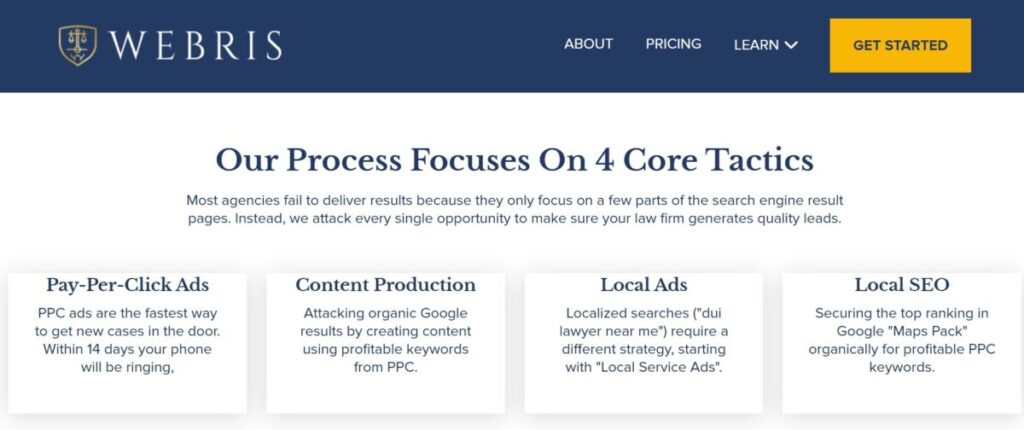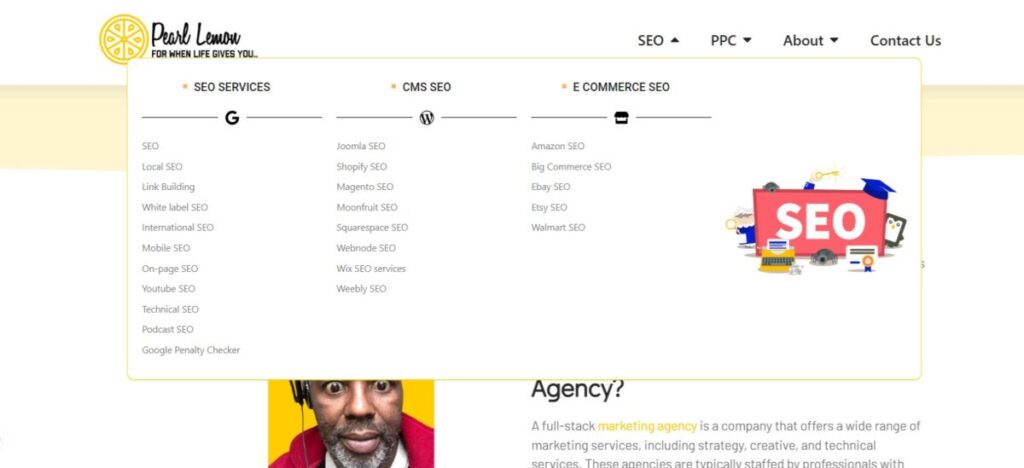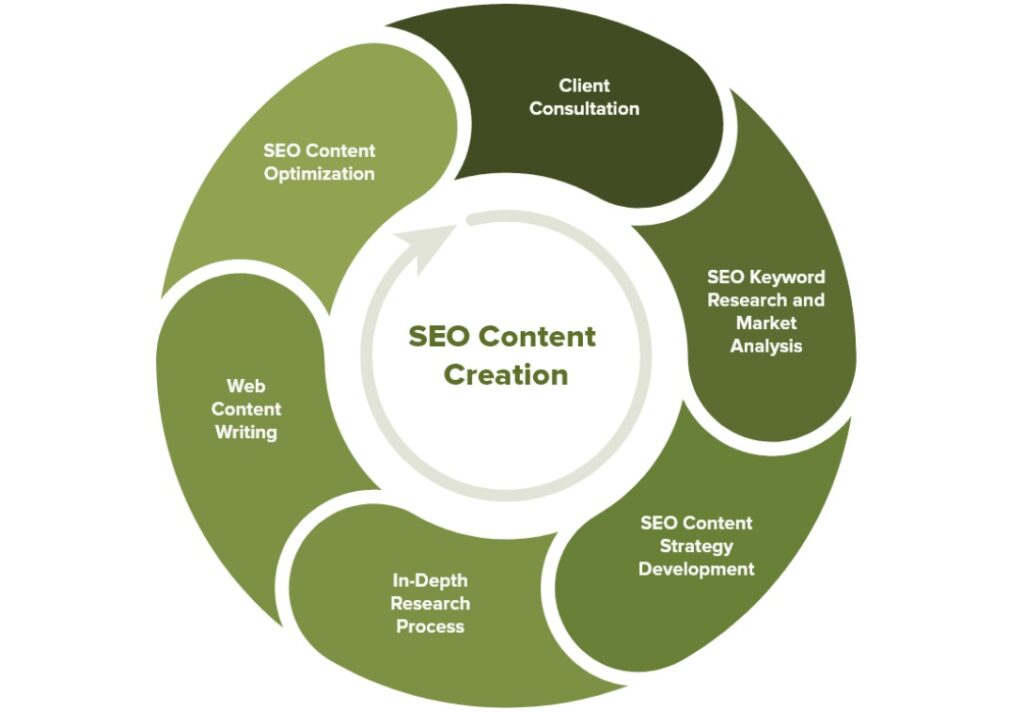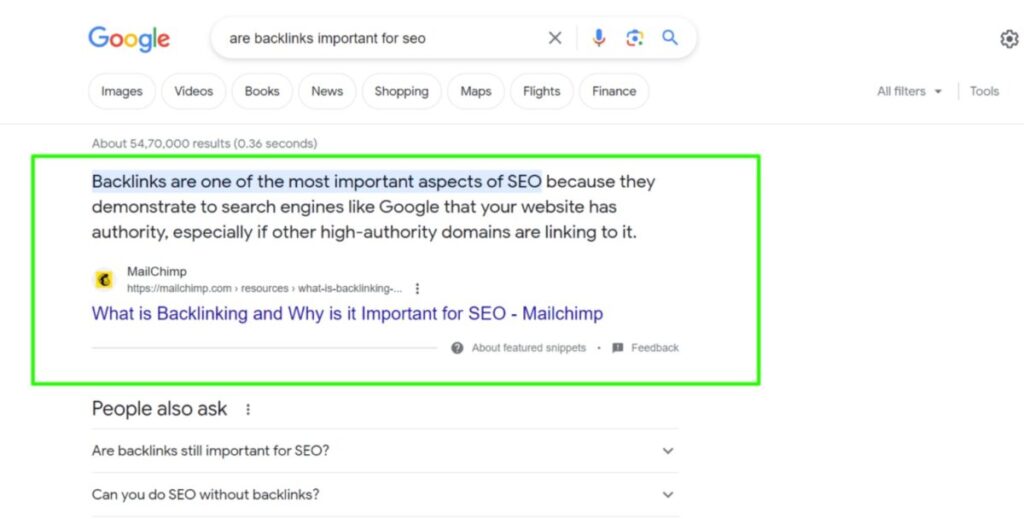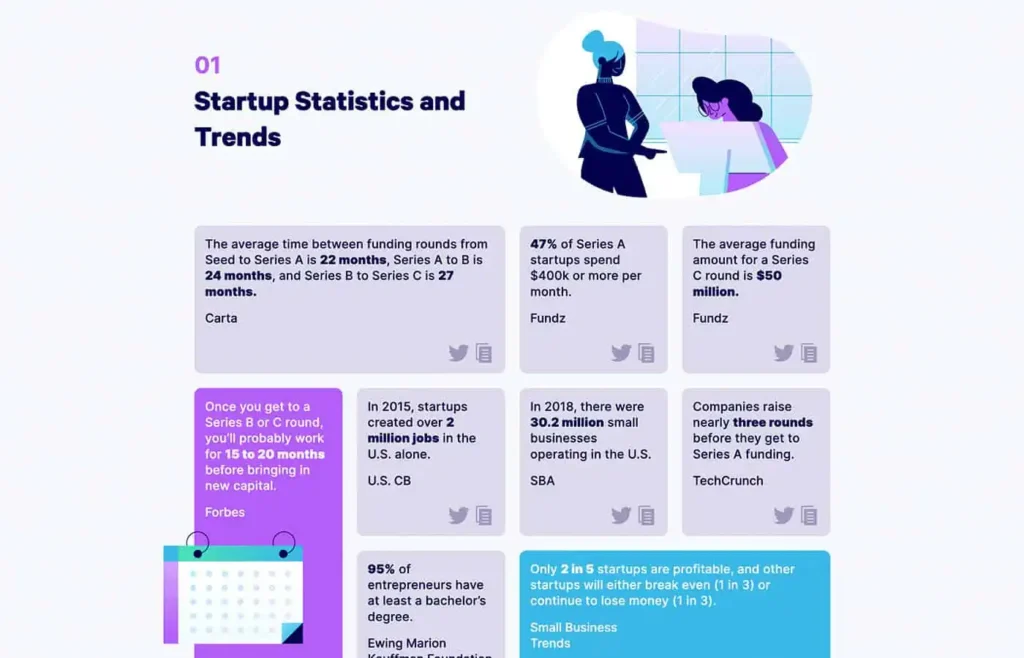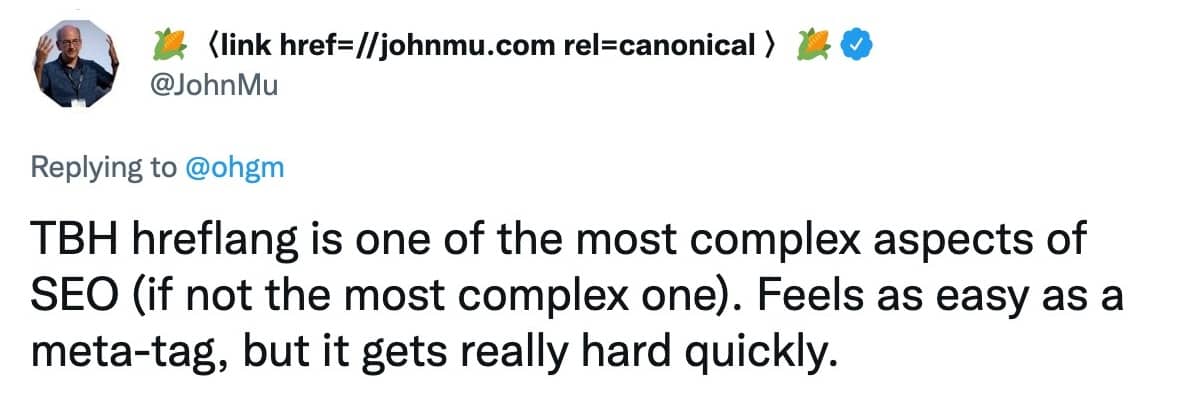Like they say, if there’s one constant in the world, it’s change. And the world of SEO is ever-changing. It only takes an algorithm change or a shift in trends, and the top strategies last week might be useless next week. Cramming in keywords in your article is no longer the trick. You need technical skills, an understanding of how people search, and the ability to adapt quickly. SEO marketing agencies are proficient and stay ahead of the curve to ensure your online visibility.
The Future of SEO Marketing Agencies:
SEO Marketing Agencies and the Dynamic Nature of Search
About 88% of marketers intend to maintain or increase their investment in SEO campaigns. SEO marketing agencies rely on SEO itself, and SEO also benefits from the agencies. The heart of these agencies’ operations is decoding how search engines measure website relevance and rank websites accordingly. If the rules and systems don’t change, the need for SEO agencies will diminish radically. Any change, regardless of size, has a profound impact. SEO agencies also assist businesses in optimizing their websites. This aligns with search engines’ objectives of showing searchers the most relevant and high-quality content.
The key to maintaining the symbiotic relationship between SEO and agencies is adaptation. When search engine algorithms are updated, so must agency tactics. Just last year, Google introduced significant changes, ranging from a core update impacting the SEO community to a crackdown on spam extending to more languages. Google also announced two significant updates this January: Circle to Search and an AI-powered multisearch experience. Both updates ultimately enhance users’ ability to search in various ways and places. With these rolling updates, a good SEO marketing agency must stay current and adjust its services accordingly.
The nature of search also changes as people’s search habits evolve. Consumers’ buying habits change primarily due to trends and influences. Static SEO strategies won’t suffice. That means agencies must also analyze the fluctuating user behavior to ensure their services match the shift.
The Road Ahead for SEO Marketing Agencies
A more holistic approach is replacing traditional keyword-focused SEO tactics. Future-forward SEO marketing agencies implement key changes to stay competitive:
1. AI-Powered Tools and Services
Artificial intelligence (AI) contributed to enhanced SEO outcomes for 65% of businesses. AI and machine learning (ML) transform how businesses and marketers use and optimize SEO. AI uses smart systems to tackle tasks similar to those requiring human thought. At the same time, ML focuses on algorithms that learn and adapt with experience.
In SEO, ML models analyze user behavior data to predict trends and preferences. For example, Google’s algorithm might learn that people searching for “coffee shops” often also want “baked goods.” This potentially affects which websites rank higher in results (e.g., websites of shops that sell coffee and pastries).
With AI, SEO agencies can boost their efficiency. AI-powered tools can analyze large datasets to uncover valuable patterns in content ranking. These tools identify relevant keywords, generate descriptions, and suggest optimizations better than manual work. Predictive analytics run by AI systems also help agencies assess and project the potential impact of trends and changes, allowing them to make informed decisions before execution.
Another way AI helps agencies is by understanding search beyond keywords. AI-powered tools can generate highly personalized results from users’ queries using their past searches, browsing history, and location. SEO agencies can capitalize on this shift by creating content that directly addresses user intent and offers valuable solutions.
A great example of a forward-thinking agency that uses AI is Clay. The San Francisco-based agency strategically incorporates AI to enhance processes and digital products. Clay created Slack’s interactive demo experience, capitalizing on the current trend of interactive content. Clay also implemented SEO localization, translating content into other languages, and aligning it with region-specific design trends.
2. Specialization
To niche or not to niche. The eternal question for many marketing agencies is whether to specialize or not. SEO is so vast that no agency can master all its aspects for all industries and businesses. That’s where niche marketing comes into play. Niche agencies specialize in specific sectors or a select range of services.
Specialized SEO agencies deeply understand their chosen field and its target audience. They employ experts with years of experience and knowledge. Because niche-based agencies are more concentrated, they can generally provide competitive pricing. Most specialized agencies also have access to industry-specific know-how that’s hard to find with generalist agencies.
Practically all industries have niche-based marketing agencies. In the eCommerce industry alone, you have options for B2B eCommerce agencies for scaling your business, Facebook-specific eCommerce agencies, and eCommerce agencies prioritizing SEO. The same goes for startups, SaaS, healthcare, and more. These specialized firms adapt strategies native to their industries. For instance, healthcare SEO agencies know how to use science-backed data to create more value-based content. Additionally, they’re more informed and compliant with industry standards and regulations.
Agencies can also specialize in services. For example, an SEO agency focusing on technical SEO is proficient in ensuring its client’s website is well-built and optimized for search engines and user experience. Another example of specialization is platform-based services. These agencies focus on platforms like Shopify, Amazon, or YouTube. Their SEO specialists have in-depth knowledge of the platform’s unique algorithms and best practices. For instance, Shopify SEO experts optimize product pages and store structure for improved visibility. YouTube SEO specialists assist in optimizing titles, descriptions, and tags to enhance the chances of videos appearing in search results and suggested videos.
Webris is an excellent example of a niche-based marketing agency. It specializes in law firm marketing and generates more qualified leads through blended search marketing campaigns. Integrating proprietary technology with its SEO team’s expertise, Webris accelerates a year’s worth of SEO work into just six weeks.
3. Full-Stack Integration
Opposite to specialization, full-stack integration is a service that more and more SEO agencies are offering. A full-stack integration is a comprehensive approach that allies SEO specialists, digital marketers, developers, and content creators. Together, they ensure a cohesive, data-driven strategy across all digital channels. The success of an optimized website doesn’t rely on SEO alone. It’s the result of many moving parts, including design and content. SEO intersects with other digital marketing areas, such as:
- Paid Advertising (PPC): Search Engine Marketing (SEM) includes both SEO (organic) and PPC (paid), and optimizing both creates a comprehensive strategy. Keyword research for PPC informs SEO, while high-ranking organic results can enhance PPC ads’ effectiveness.
- Content Marketing: Producing high-quality, relevant content is essential in optimizing SEO. Content marketing teams create content, while SEO specialists ensure it’s discoverable by search engines.
- Social Media: Social platforms function as mini search engines. SEO experts can optimize social profiles and content to increase reach. Also, a robust social presence can generate more links back to a website, positively impacting SEO.
Full-stack integration allows SEO agencies to eliminate silos between various digital marketing specialties. An agency that lets its team collaborate—experts, developers, strategists, designers, and marketers—produce a more cohesive campaign. They can deliver an optimized user journey from the search query to the landing page experience and continued engagement on social platforms.
By integrating SEO with other disciplines, agencies also unlock the potential of an integrated data ecosystem. Combining search insights with website analytics, social media engagement metrics, and PPC campaign data provides invaluable insights into user behavior. This comprehensive approach can identify patterns and opportunities that teams may otherwise miss by working independently.
Pearl Lemon is an example of a full-stack marketing agency. It offers various services, including strategy, creative, and technical assistance. It employs in-house experts skilled in multiple aspects of SEO, from local and CMS SEO to eCommerce SEO and its subcategories. Working with this full-stack agency gives you detailed marketing support, experience, and expertise to help your business thrive and scale.
How SEO Marketing Agencies Approach Shifting SEO Trends
The digital marketing landscape is highly competitive. SEO agencies that understand and adopt future trends continue to thrive. Here are three top SEO trends and how forward-thinking SEO agencies adjust to these changes.
1. E-E-A-T and Brand Authority
Google uses the acronym E-E-A-T (Experience, Expertise, Authoritativeness, and Trustworthiness) to assess the quality of your content. These factors appear in Google’s Search Quality Rater Guidelines (QRG), which help determine if your website deserves a high ranking on SERPs.
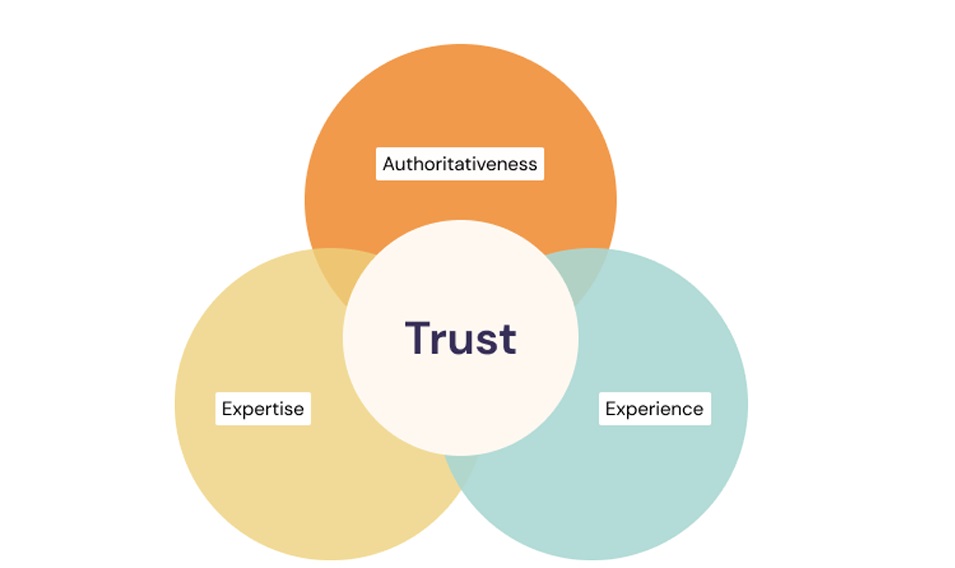
Source: static.googleusercontent.com
- Experience: This means demonstrating first-hand knowledge about a topic. It’s particularly important for product reviews, where genuine insights help potential customers make informed decisions.
- Expertise: Show that you possess in-depth knowledge and skills within your field. Google evaluates this at the page level, not just for the entire site.
- Authoritativeness: This reflects a strong reputation in your industry. Do others view you as a reliable source on the topic? Do they frequently reference or link to your content?
- Trustworthiness: This is the most crucial E-E-A-T element. Your website must be accurate, honest, secure, and reliable. The standard of trust depends on your content; for example, secure payment systems are essential for online stores.
E-E-A-T’s prominence in Google’s QRG underscores its importance, signaling a shift from prioritizing technical aspects to prioritizing content quality. By adhering to E-E-A-T guidelines, websites can foster trust and enhance user experience, combating the spread of false information online.
Here’s how SEO agencies can help you boost your site’s E-E-A-T:
- Write for Your Audience: SEO experts know your readers are people, not algorithms. As such, they create content with a human touch. They address your audience’s needs, providing helpful tips and solutions.
- Expert Collaboration: SEO services can connect you with subject matter experts, or they work with them for in-depth knowledge and insights. They do interviews and provide information from industry experts. These add credibility and attract readers who want reliable information.
- Accuracy and Citations: SEO agencies thoroughly fact-check your content to ensure accuracy and reliability. They support claims with reputable sources and provide citations for referenced data, statistics, or research, reinforcing the integrity of your content.
Thrive Digital Marketing Agency offers a holistic SEO content writing service that values E-E-A-T. The agency’s SEO process starts with a client consultation, followed by SEO keyword research and market analysis and formulating an SEO content strategy. Afterward, your assigned SEO expert will conduct thorough research, and its content writer will produce SEO-optimized content.
2. Position Zero
Position Zero, or Featured Snippet, provides brief information at the top of Google’s search results. Featured Snippet occupies prime space in zero-click results. Its goal is to instantly address a searcher’s query without clicking through to a website. The snippets are automatically extracted from indexed web pages. They can take various forms, such as paragraphs, lists, or videos. Google awards this sought-after spot to the page with the most concise and valuable information.
To secure a Featured Snippet, you need to do keyword research to focus on answering users’ questions directly and instructively. Tools like SEMrush can aid in this process. Once you’ve identified target keywords, structure your content accordingly. Use clear headings and present your answers in lists, tables, or short, direct paragraphs.
While you can do this on your own, outsourcing the help of an SEO agency is wiser:
- Strategic Analysis: Agencies will dissect your existing content to see what could be optimized for Featured Snippets. They’ll also analyze your competitors, identifying the kinds of questions answered by those coveted Position Zero spots. This lets them spot gaps where you can provide better, more informative answers.
- Technical Excellence: Agencies ensure search engines can easily crawl your site, fixing broken links and coding issues. They’ll also optimize your site’s structured data to help Google understand your content.
- Constant Refinement: SEO agencies never stop monitoring your search results. They’ll continuously analyze featured snippets and your competitors’ strategies, tweaking your approach for maximum impact.
SEO marketing agency Moz has explored various methods to discover Featured Snippet opportunities. Additionally, they offer resources such as webinars detailing how to optimize existing content for Position Zero and even an informative flow chart:
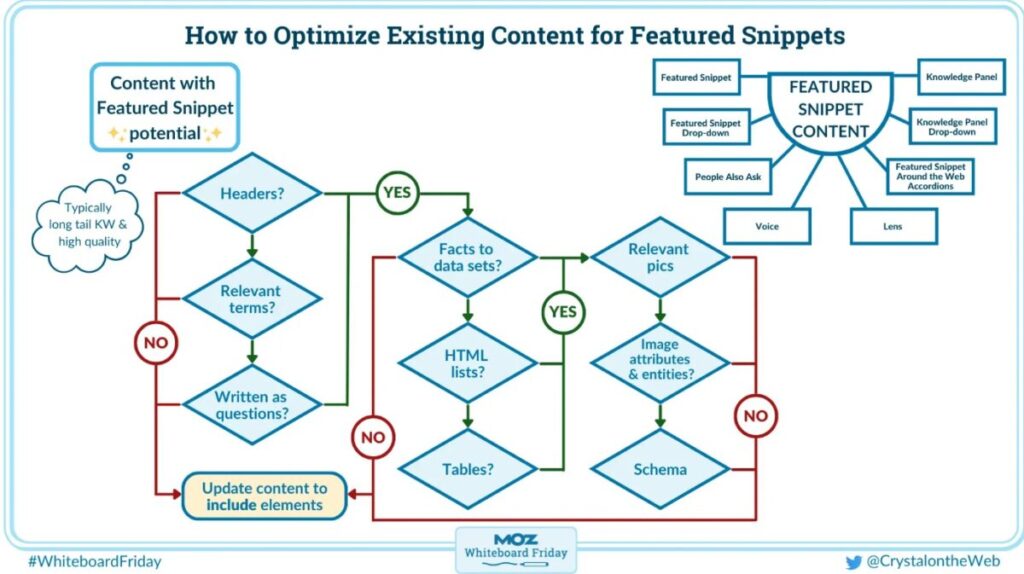
Source: moz.com
3. Interactive Content
Have you ever answered a “Which Disney Villain Are You” quiz? Or use an ROI calculator from a marketing website? Surveys, quizzes, polls, calculators, clickable infographics, shopping videos, and any content that lets you participate are interactive.
On average, people spend 13 minutes interacting with interactive elements, longer than the 8.5 minutes spent with static content. This is because interactive content asks users to participate, not just passively read or watch. This boosts engagement, keeps people on your website longer, and sends positive signals to search engines.
But it’s not just for fun. Interactive content personalizes the experience. The user becomes part of the story, making their visit to your website memorable. Interactive elements can be seamlessly incorporated with SEO in various ways. Adding relevant keywords in the element improves searchability. Mobile-friendliness and fast loading times prevent increased bounce rates and preserve SEO integrity.
Here’s how an SEO agency can help with your interactive elements:
- Create Compelling Assets: Agencies have specialists who can create and design fun and engaging interactive elements. There are many interactive elements online, and a specialist can help you stand out from the saturated crowd.
- Optimize Content for Search Engines: You can do your personality quizzes and polls, but let the agency handle the technical details. SEO agencies can ensure search engines can easily find, understand, and index your content. They can also fine-tune relevant keywords, meta descriptions, and alt text to boost your content’s visibility.
- Track and Report Results: Expect regular reports from agencies detailing the SEO performance of your interactive content. They monitor crucial metrics such as rankings, organic traffic, backlinks, dwell time, and social shares, enabling you to gauge the impact of your interactive content strategy on your overall SEO endeavors.
Siege Media has developed numerous interactive content pieces for clients, enhancing the value of their websites. For example, they crafted startup statistics for Embroker to establish it as a prime resource for essential startup data. This interactive piece allows users to navigate to their preferred stats and easily copy or share them. To date, the piece has garnered over 1,300 links.
Final Thoughts
In the ever-changing landscape of SEO, clinging to outdated practices means a loss for marketing agencies. To stay competitive, you must embrace emerging technologies, adopt new practices, and continuously experiment with fresh strategies. Survival depends not just on keeping up with changes but also on anticipating and driving them forward.
Frequently Asked Questions
Is SEO still relevant in 2024?
Yes! SEO moves forward swiftly as the digital world evolves. As such, it will remain relevant for businesses that need to boost their online presence and attract organic web traffic. Even with the constant changes in algorithms, optimizing for search engines remains indispensable.
Which is better: an SEO agency or a freelancer?
Generally, an SEO agency provides broader expertise and resources than a freelancer. However, the best choice depends on the project requirements, budget, and timeframe.
Which industries or businesses require SEO services the most?
One way or another, all businesses with an online presence need SEO. However, specific industries and businesses need it more. In particular, eCommerce and businesses with intense local competition (e.g., plumbing, salon, food delivery) heavily rely on SEO as they compete directly in online search results.

